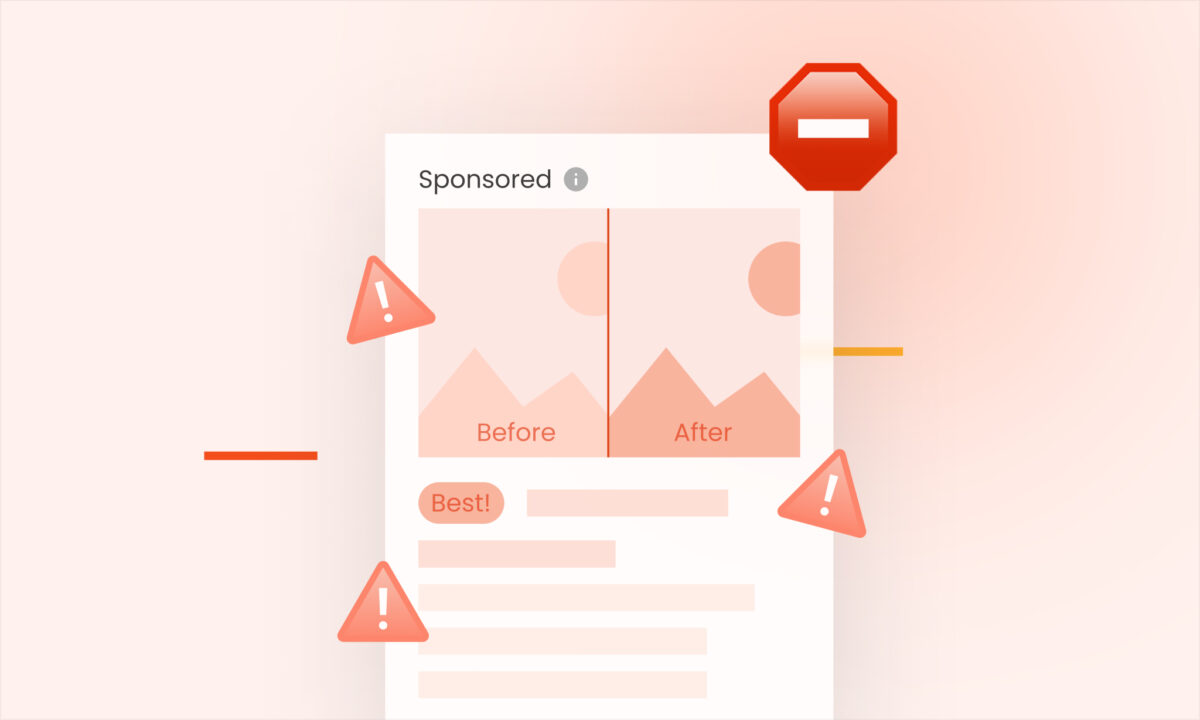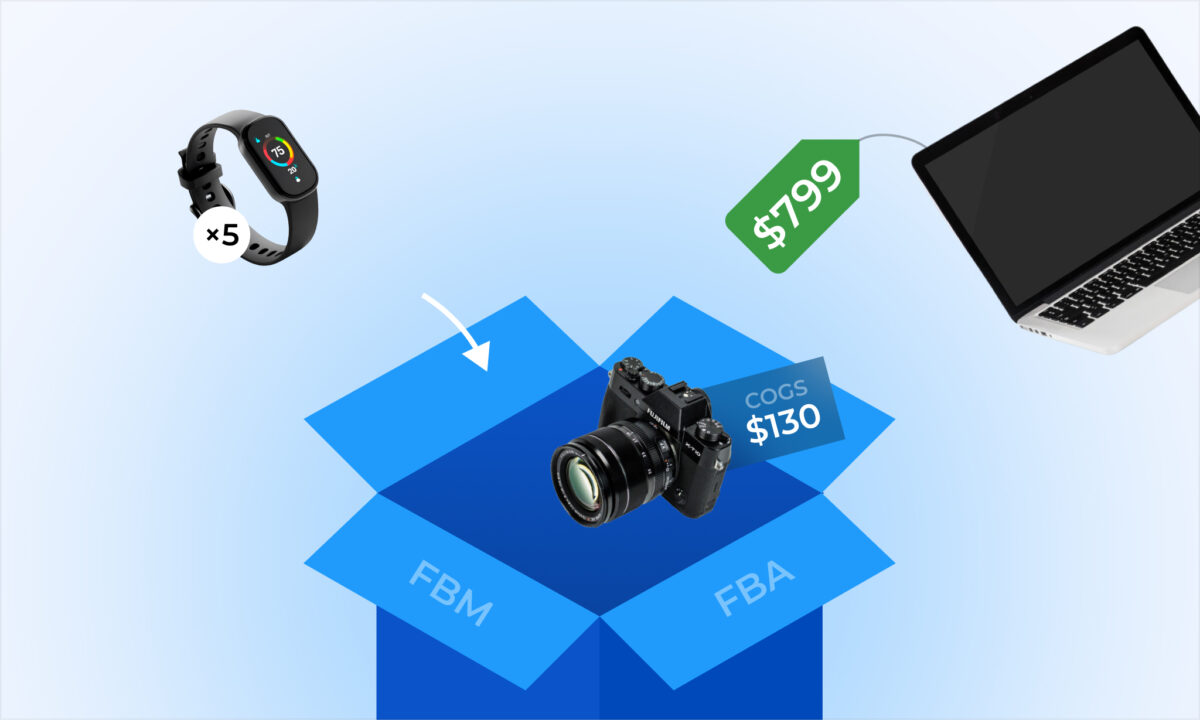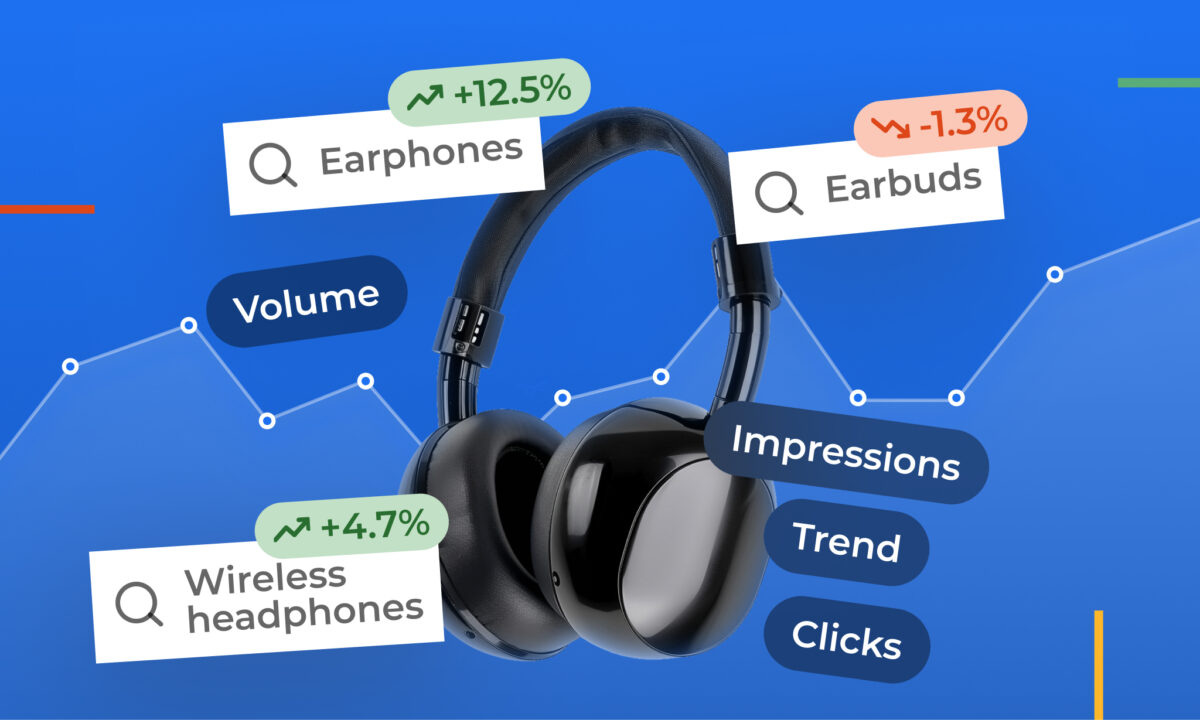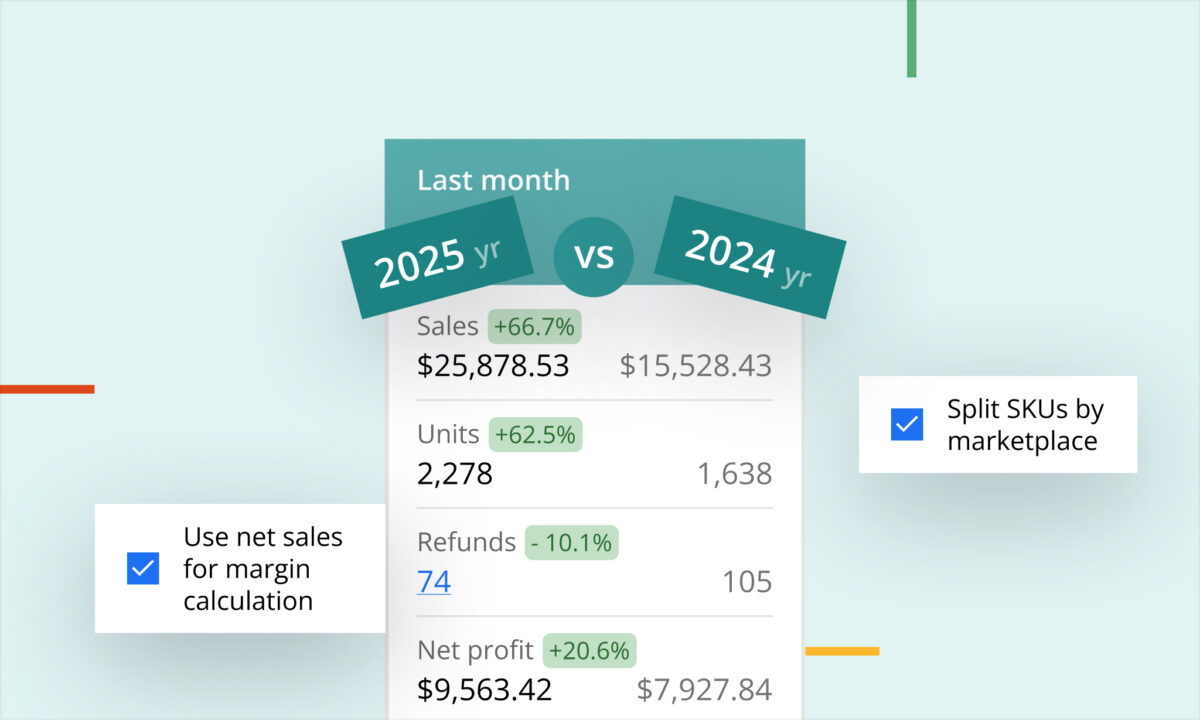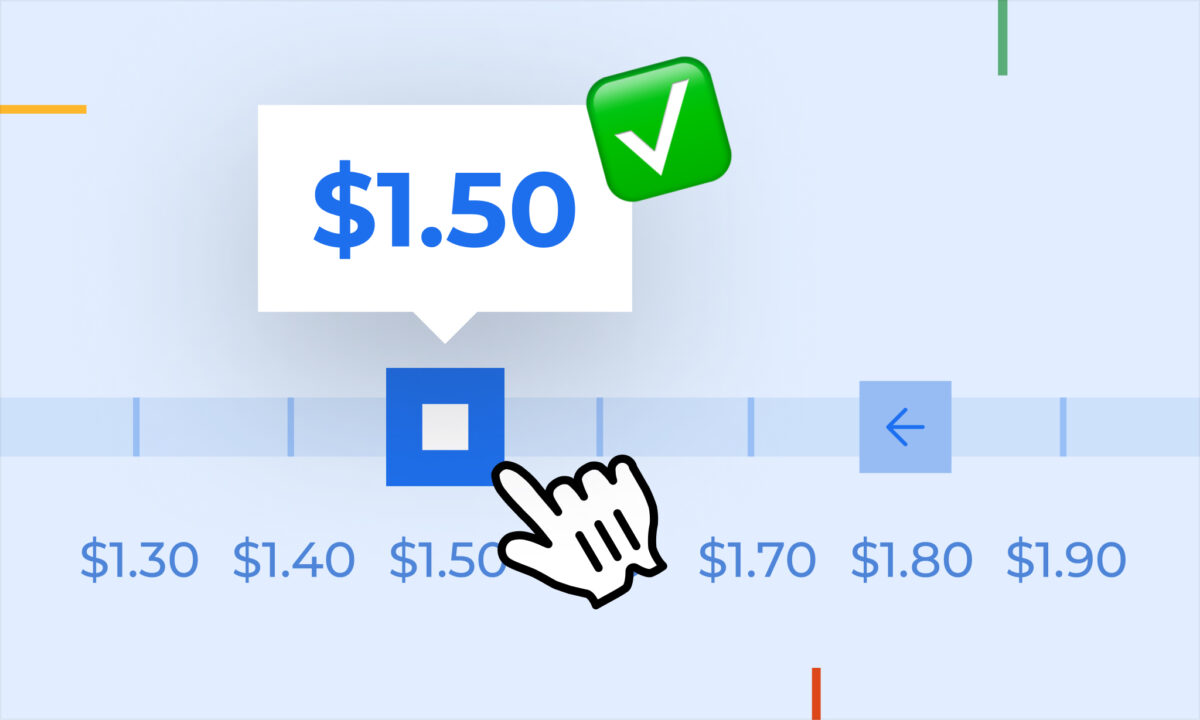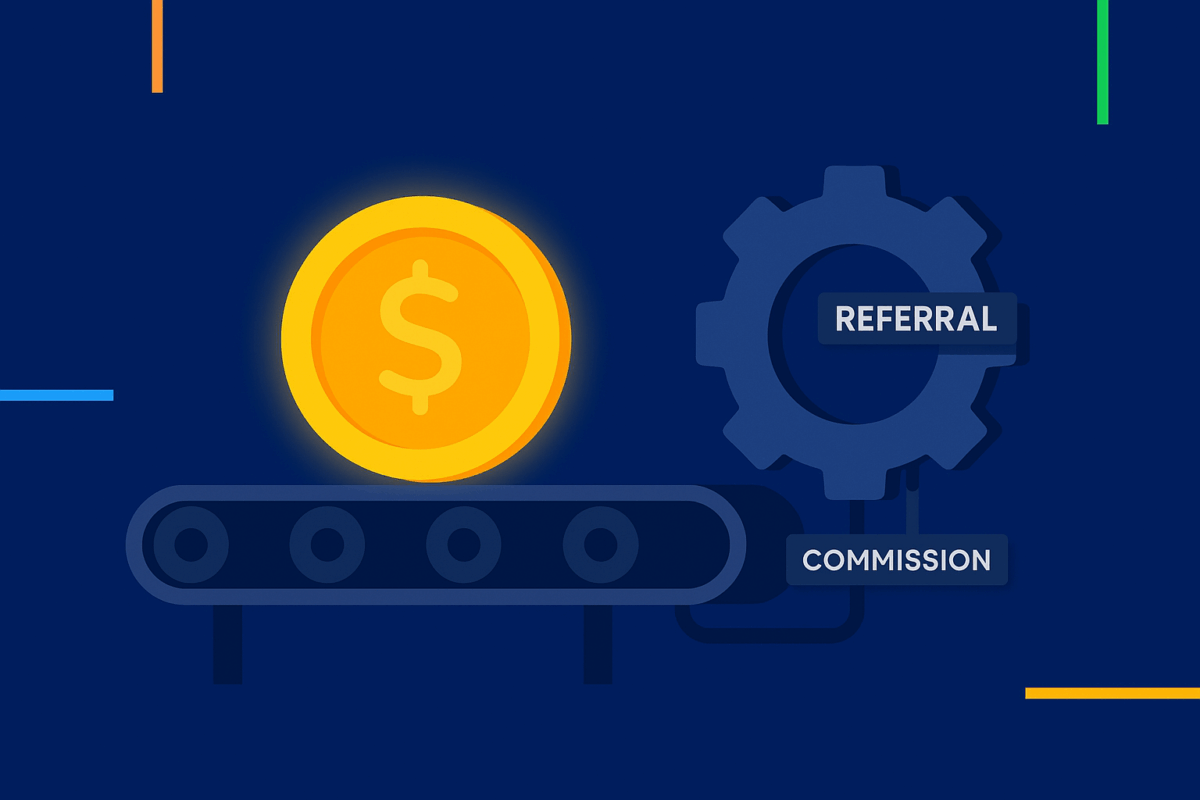Our guest on the 6th of January, 2020, on the sellerboard show was Chris McCabe, a former Amazon employee and founder of eCommerceChris.com
We talked about the most common suspension reasons, how to avoid suspensions and what to do if one of your listings or your account got suspended.
Watch the full video here: https://www.youtube.com/watch?v=WEKetuCrAcY&t=499s
[00:00:07] Hi, guys, and welcome to The sellerboard Show. My name is Vladi Gordon. My today’s guest is Chris McCabe from eCommerceChris.com. So Chris used to work at Amazon on the seller performance team. And if you don’t know what the seller performance team is, then you’re probably very lucky because this is the team which is basically getting involved. If. If sellers have any problems, right, or if Amazon thinks that the seller has any problems with suspensions and reinstatement and listing suspensions and, you know, all other kinds of issues that you probably don’t want to deal with. Right. This is what the seller performance is doing. And for us, it’s, of course, very valuable to understand how this team works from the inside, what they’re thinking about and what’s important to them. And this is what basically Chris shared today. So we talked about the most common and most important suspension reasons. And Chris gave us a couple of tips, how to avoid them and what to do if you are getting suspended or one of your listings got suspended. So this is going to be very interesting. Make sure you press the like button and make sure you subscribe to our channel. We’re releasing these interviews regularly. So stay tuned. Now, before we start, the show, sellerboard is our profit analytics service for Amazon sellers. And our vision is to be the world’s most accurate, most user-friendly and intuitive tool at a very competitive price. So sellerboard subscription starts at nineteen dollars a month. You can get a one month free trial if you follow the link below this description.
[00:01:59] Below this video and there is a ton of other tools in the package, like the inventory manager, which will send your order restock alerts. Or like a moneybag module which helps you find cases where Amazon owes you money for damaged or lost goods at PPC Dashboard for PPC profitability and optimization and a lot of other stuff. So check out our homepage. And now let’s start to show.
[00:02:33] Hello, everybody, and welcome to the next episode of the sellerboard show. My name is Vladi and today I have Chris McCabe with me from eCommerceChris.com. Hi, Chris.
[00:02:43] Hi. How are you doing?
[00:02:44] Doing great things. How are you?
[00:02:47] Pretty good. Hectic time of year, but everybody has peak holiday on their minds right now. So it’s going to be talking to you.
[00:02:55] Cool. Thanks for coming. So, Chris, tell us about yourself.
[00:03:00] Worked at Amazon for five and half, six years on performance and policy teams. And now I’m five over five years and as a consultant for who get their account suspended or their ASIN is taken down. We help people deal with policy warnings and help them correspond with my former teams more and less.
[00:03:19] Very cool. So I think it’s the first time we have somebody who used to work at Amazon. So tell me, like, how is it like how is working at Amazon?
[00:03:32] You know, it was a little bit different when I was there. It’s changed a lot. It’s always been a kind of a high pressure environment. But now they’re really pressuring people to complete work quickly and not necessarily double checking the quality of the work. There was a lot more emphasis on quality when I was there.
[00:03:51] Now they’re encouraging investigators to rush reviews of accounts. Unfortunately, it’s resulting in a lot of mistakes being made and just kind of a disorganized way of looking at an account, annotations, looking at how they want sellers to correspond with them and behave. I think Amazon changes their mind a lot and there’s a lot of inconsistency.
[00:04:14] Ok. That doesn’t change, does it? So good for sellers.
[00:04:18] I think it’s getting tougher for sellers to communicate with my former teams. I think we had more of an emphasis on the other five or six years ago.
[00:04:28] So we know about this performance team because it looks like these are the guys who are deciding basically about like a suspension or at least.
[00:04:41] But tell us, like, how is it basically working? Like, I also know these are the guys that you can never talk to on the phone, so you should call support. You never know the performance team. So what is the work like?
[00:04:55] Like what are they doing the whole day?
[00:04:57] Basically, they’re reading a lot of appeals all day. They’re reading they’re opening up a lot of attachments. Everything you’d expect them to look at when you send them something like an appeal for an account Greens statement.
[00:05:09] But they’re encouraged very quickly and they’re punished for moving too slowly. And there’s not a lot of auditing of investigation quality anymore or it’s not consistent enough. So they’re rushing through the work, but they’re not necessarily being reprimanded for making mistakes. There’s a lot of mistakes. I’ve never seen that many mistakes in the last 10 or 11 or 12 years. I mean, there’s probably more mistakes being made now than ever. From what I’ve seen. Well, so it’s a it’s an environment where they don’t have a lot of I mean, to defend the investigators. They don’t necessarily have a lot of great training. They probably don’t have a lot of productive coaching in terms of somebody who’s experienced, who’s a veteran pointing out. And then beyond that, the environment is just pedal to the floor all the time. Right. So you don’t really have a moment to step back and fix something that breaks you. Just try to patch it together and, you know, make the machine keep running. I don’t think they’ve figured out how to do that efficiently just yet.
[00:06:14] Well. Well, look. So I’ve been a seller myself previously, and I know.
[00:06:22] And also from. From our clients that it’s a nightmare if your client gets spend it or a full listing gets blocked, especially now or no. In December, 2019, it’s Christmas time. So something like this happens before Christmas can really cost you your business. So. And I know you’re helping sellers like resolve those cases and you prepared a list of the most common problems.
[00:06:51] Right. And suspension reasons and so on.
[00:06:54] So, yeah, we’d like to discuss this list and share basically these problems and maybe talk about solutions today.
[00:07:03] So let’s work through this list. Tell us what have you got? What’s the most common problem you’re seeing lately?
[00:07:14] So I didn’t create a chronology or a hierarchy of these. I pick the five most common. So obviously anything around rights ownership is key.
[00:07:26] Anyone who has a private label brand should be registering it mark and doing brand registry and getting it. That all set up before you even start to sell. I know there’s some sellers contacting me who say that they don’t necessarily want to trademark everything. They might want to launch a product and test it. Yeah. And they started as a generic listing and then maybe the lad branding information later on paper. That seems like a good idea, but in practice it’s not a very good idea. Somebody else will register that or somebody might accuse you of selling counterfeit products because. You haven’t registered the brand. You won’t have the access to brand registry if you have in trademark registered. So I’m encouraging everyone to do as much prep as possible before they even start. Otherwise, they might get a patent complaint. Somebody says you’ve used our you’ve infringed upon our patent rights and I’m not have rights ownership expert in terms of the law. I’m not an attorney, but I’m an expert on the notice processes built around protecting rights, ownership and the warning people, deleting listings, punishing people for infringing. And what I’ve noticed is that a lot of sellers don’t understand rights, ownership, whether they’re resellers or private label, on top of the fact that they don’t understand how Amazon needs to protect against their own liability, when they need to make sure that they’re not constantly getting in between brands and resellers, for example.
[00:08:50] So they have certain rules they put into place certain policies to protect them. Right. So it’s not so much resellers or other sellers that you have to worry about. Sometimes it’s you have to worry about Amazon’s disinterest in dealing with your rights ownership issues. If you set things up the right way, then maybe you’re not so much of a problem. And they don’t have to warn you things. And you’re not vulnerable to attack against your brand if you don’t set things up the right way. If you hire the wrong attorney, you know, these are big, big mistakes that can really ruin your business down the road, if not right away. So I’ve been encouraging everyone to study right. Senatorship issues. You know, it trademarks are know what patent is. Don’t assume, you know, these things. Understand what copyright is. Had to do it, too. I was I wasn’t an expert in the law until I had to master these issues myself. So.
[00:09:49] So it looks like a great idea.
[00:09:53] Of course, and I think that to me was also pretty intuitive that you should do the trademark first.
[00:09:59] But on the other hand, as it said, a lot of sellers starting with doubt because you don’t know if the product will work or if the brand will work, if it’s worth the effort. Right. You want to start. Just quickly and fail. Quick theory. So what might happen in worst case if we don’t have a trademark register and know you’re eligible?
[00:10:19] Yeah, you’re vulnerable to attack and mean anti-competitive attacks are commonplace. They happen all the time. I talk to people every day about this. So you’re just leaving yourself vulnerable to attack from another seller and sellers? Over the last year or so, I’ve really perfected ways of attacking brands in ways that Amazon won’t help you sort out. Right.
[00:10:39] And what’s that? It’s like big in baking a relisting or did they, like open a case against myself or they can submit it.
[00:10:47] They could submit an infringement claim against you saying that they’ve registered the trademark and you haven’t. They’ve got the trademark. You’re infringing on them even if it’s your product when they’re reselling it. Some of these things can be worked out well after the fact. But it creates a big mess. When you have the brand behind you, when you register the brand, you have the law behind you. You’ve got to trademark. You’ve got a lot more weaponry to fight back. Yeah. Copyrighted images, obviously, you need to enter. You can’t borrow images from somewhere else and use them as your own. When it comes to something like patent law, obviously, you have to understand before you design something, whether or not you’re borrowing or you’re too similar to somebody else’s patent. And that that should be just as important as testing a product to see how well it’s going to sell. I think this is kind of an afterthought for a lot of people. They don’t think about these things until they’re getting attacked. And I’ve seen I’ve just seen a lot of sellers make mistakes. They start Googling attorneys and they get the one with the biggest ad or the one with the best name recognition. It might be the worst attorney out there, but they don’t have time to research it the way they could before they start it.
[00:11:58] So for somebody who has a product without the trademark registered and brand greatest, is it some but which is already selling basically. Yeah. Is it. Is it possible to do it like after the fact after you launched basically registered brand and then apply for the Brentwood people do it.
[00:12:17] Yeah, people do it. People register the trademark afterwards. It’s just that the game has changed and you’re much more vulnerable now. You don’t have as much runway as lunch time to do that now. Anything that sells at all will be attracting attention. And if they realize you’re not registered trademark, they really protected yourself with proper rights, ownership, steps and measures. Then they know you’re vulnerable and they know you’re selling some successfully and they know that you’re vulnerable. So they’re going to try to take some of that revenue away from you. And you’re making it easy for them to do it. And I guess I only bring it up because these things can be avoided if you prepare enough and if you research enough in advance instead of just plunging in. Yeah. So.
[00:13:05] Got it. Very cool. So register your trademark case as early as possible.
[00:13:10] All intellectual property. I would study each facet, any copyright, trademark or other intellectual property issues that could come up. What, while you’re selling your own products to protect yourself and your brand? So got it. That’s kind of my number one.
[00:13:27] I mean, around that, we also have a lot of people who are getting complaints about safety, either authenticity or safety. Those are the two biggest concerns Amazon has. Who will? Will somebody complain that your products aren’t authentic, aren’t genuine, or will they say that they’re unsafe and they’re a hazard? And there’s a variety of different hazards, right? Electronics are different from supplements or something consumable. But at this point, Amazon is concerned about any safety complaint or any pattern of safety issues. So whether and recently you’ve probably talked to people about the rise and expired items. Right. They’ve been pushing a big focus on expired. So I’m just encouraging people to do as much quality control as possible. And if they get a complaint from a buyer to really listen and really research it instead of just saying know they don’t want to return it and have to pay for the return shipping, I mean, listen and research it to see if there’s an actual complaint there that you might get again.
[00:14:25] So what’s it somebody do if you get a run into a problem with slick, you get an authentic then basically. So, yeah, what’s what should somebody do? I mean, of course, if Amazon is true, then if it’s right that you’re selling authentic products, then it’s a different path. Maybe we don’t need to discuss it here, but let’s suppose you’re doing everything correctly and then you’re getting this because men like, you know what? What do you do then? First of all, why? Why does it even happen? Is it a mistake?
[00:15:02] Well, let’s forget, sometimes it’s a mistake. Sometimes they’re interpreting a buyer complaint the wrong way. But let’s forget the word inauthentic for a moment and just think about item quality, whether it’s a safety complaint or somebody says these are fake, these aren’t genuine, and you only make your own product. Obviously, they just mean they don’t like the quality of the item or the or the condition, it could be a condition. Oh, my first recommendation is to pull some inventory out of FBA and open up some boxes and start looking at what you think they’re looking at.
[00:15:29] What are they complaining about? You’re supposed to be an expert in your own product. If your quality control isn’t substantial enough, then maybe you’ve got a problem at the factory level that you have to deal with. I’ve talked to many sellers who they’re factory in China, started swapping out cheap raw materials and they didn’t know about it right away. I’ve heard thousands of these stories over the years. You have to watch this stuff all the time. Amazon doesn’t want you shipping straight to FBA without having any idea. Yeah, the items listed on their site is the same, the same quality. It sounds basic and fundamental to say these things, but in reality, a lot of people over time stop inspecting as much and they stop going to check the factory. They stop opening boxes. So. Yeah, I recommend continuing those practices, not just your first month of a product launch, but ongoing and maintaining that compliance or inspection process throughout your sales and your shipments.
[00:16:32] Okay. Got it. And like what? What do you do if this happened? Do you just answer the complaint or do most want an action plan or they want a plan of action?
[00:16:46] It starts typically with an ace and is taken away and might be your top-selling ASIN. So losing and a good selling successful ace might be the same as an account suspension to some people. And the process isn’t the same for a plan of action. They typically want supply chain documentation, but they want you to prove to them, convince them that you’re not going to run into this again. That that your due diligence, essentially a plan of action is convincing them with due diligence improvements that you can be trusted to sell those products again. And if your whole account is down, that you can be trusted to sell at all. So why are they so tough on people? It’s because they’re afraid that if you don’t make enough improvements, that 30 days from now you’ll be facing the same complaints and they’ll have to review you again. And if and if they don’t suspend you, then they’re going to have to look again in 30 days and then suspend you then. And it’s an endless cycle. They’re trying to break the cycle. That’s why suspensions are so easy to come by.
[00:17:43] Like, is there a chance for a seller to win such a case? I mean, that’s.
[00:17:50] No. Will he actually ever inspect the physical products themselves? Or is it just the communication with just go there? You have to give specifics.
[00:18:00] You have to be Amazon’s they’d ask for better details because sellers weren’t giving them details. They were making promises. A plan of action isn’t just a list of promises. I still see those. It’s a list of action items. But specifically, why will those help? Why are those convincing? Why should Amazon give you another chance? Well, based on those steps. Well, they’re only going to give me another chance. And if they believe that the steps will remedy the problem and prevent it for the future. So if you can’t convince them of that, then they’re going to keep asking you for more. I mean, these are fixable problems. Most account suspensions can be resolved positively. And I think some sellers got the impression that the count rings and it’s possible to do because they’re not sending a good plan of action and they think it’s good. And maybe they show it to a seller friend and that person thinks that’s good. Yeah, but show it to somebody who understand that. I mean, that’s why I’m usually in favor of, you know, if somebody worked on my former teams, I mean, somebody worked at the company. Well, because there’s a lot of people out there advertising themselves as experts. Right. There’s a lot of self-promotion in the Amazon space. So you’ve got to be careful of deciding that the plan of action you sent down is really good. Don’t assume it’s good if it’s not good and they’re not going to read it.
[00:19:24] So so tell me, Chris, it’s like like let’s say, for example, we’re talking about lost intensity or we have a customer complaint like a stellar performance team member.
[00:19:36] Will they actually go out and go to the warehouse and pick the product?
[00:19:42] So it’s only like a digital communication, which makes it seems like it’s just a fantasy that you’re promising things and no one actually checks it.
[00:19:53] But if you continue to have this, if you’re reinstated and you continue to have the same problems, they just shut you back.
[00:19:58] Yeah. I mean, of course, it’s not just completely virtual because they get to keep you eyes. But I mean, the process is so there’s nothing physical going on there.
[00:20:07] So you basically you as a seller, you have more or less you’re doing the physical part, you’re doing the inspections, you’re pulling inventory, you’re doing all the physical running around. And then based on your research and results, you’re composing the plan to petition for another chance to sell. You have understand. Almost every item that exists is available on Amazon now and someday in the future, Amazon will have their own basic brand, will look for anything that exists, not today and not this year. But so you have to think in terms of you’ve got competition and you’re not necessarily irreplaceable. Yeah, your brand is you might be replaceable by another seller tomorrow. So that’s right. I’m not saying that to scare people. It’s just a reality. And I don’t think people should hide from that reality and just blame Amazon for being too tough on them. Amazon’s always going to be tough on people that you’re not going to. So you have to kind of rise to their level and up your game as opposed to, you know, people complaining that the process.
[00:21:15] Yeah, sure. Yeah, it does. It doesn’t help, though. Yeah. All right. Cool. So what’s the number three?
[00:21:24] So another one is we’ve seen a lot of listing compliant suspensions. This comes up a lot with a variation. I’ve done a couple of interviews and videos on this with a colleague of mine, Leon McHugh. Most sellers that get suspended for this. Tell us that they’re flat files are correct or they don’t even have flat files, but their listings are correct. Ninety something percent of them aren’t doing it correctly. They think they are doing it correctly, but they’re not. So I’ve been concerned that there’s a gap between what’s being done and what’s accurate or correct. Amazon has filled that gap by suspending people for things that they didn’t use the suspension for. They used to send warnings. Right. They would give you a list of basins and say, we’ve corrected these detailed pages and you might get four or five of those warnings. I don’t know how many. Now, maybe you get one or if they think it’s chronic, your account. Some variations. Understanding, variation, themes, obviously depends on what you’re selling and what category. The rules are different depending on where you are. It’s essential to have staff or somebody who understands listing compliance. You’re not creating duplicates. You’re not making mistakes with variations. You’re not adding sellers specific information to a listing which would exclude another seller from selling the product. Yeah, 100 percent guaranteed anything so specific. Money back guarantee. There’s tons of examples, but unfortunately we’re still seeing sellers filling their listings and their titles with incorrect information. That’s a kind of a one way ticket to an account suspension. And that’s very avoidable. You don’t need to go through the pain of a suspension if you understand listing combined.
[00:23:16] You mentioned money back guarantee. Does it mean you’re not allowed to mention the money back guarantee and the listing, if anything?
[00:23:24] No listing that’s not going to apply to any other seller provides that listing. Doesn’t matter if your private label or not, it’s an open marketplace. Yeah. Somebody else who’s selling your products, at least in theory selling your products, can’t join a listing that excludes them because they can’t offer the same product. You can’t offer what you offer. That’s a misuse of of product detail page content. And the sellers get suspended for that all the time. No.
[00:23:52] Well, what if. OK.
[00:23:53] So there are promotional content. I mean, there’s a lot of things and added to listings that don’t belong there.
[00:24:00] So, I mean, I’ve seen some listings as as a buyer and Amazon where you like sleeping for a no or maybe for headphones. And then, you know, does that some reviews apply to a to a phone case?
[00:24:14] Right. Because folks used to be a variant of this product. Or maybe it still is. Right.
[00:24:19] Merges. You mean improper merger as a base. And that’s kind of a different problem. Anyone who is left doing. I’m sure there are people, maybe people who are watching this stuff and trying to get, you know, improve their reviews based on that practice. But I’ve worked on a lot of account suspensions for that. So if you’re doing that, still word is kind of out. Let me know. The policy team kind of all over this. I don’t expect to sell very long if you’re still merging ASINs and properly.
[00:24:49] Well preserved can be used. Yeah.
[00:24:55] So we’ve got listing complaints. All right. I get it. That’s something different emerging, but still a format.
[00:25:03] Didn’t really think of it that way.
[00:25:06] Right. I mean, to be fair, people are still doing a lot of these practices, just like with product reviews. Is the next one I was going to bring up. Plenty of sellers are still an ax. I’m sorry, asking for reviews the wrong way. Promising a product, a free product known as positive review anymore. Nobody does that, but they find other ways to work around it. So maybe have a gift card, maybe have a rebate at the end of the process. Maybe you have a free gift or a heavily mounted product down the road. I mean, that all induces positive reviews. People are still doing these things, even though every few months there’s a mass purge where thousands of sellers are suspended for these practices. People are still watching YouTube videos from Googlers who don’t talk about compliance at all, who don’t care how many people get suspended. I mean, that happens every day. Yeah. So product reviews, product inserts, people are still violating policy with inserts that encourage positive reviews or ask for five star reviews. And I think no one’s ever going to see it, I guess.
[00:26:18] But how is this actually being like, oh, help us that we can find out that there’s a insert to go ahead and open the box?
[00:26:30] Ok. Usually it’s a bear reported to you because they don’t like finding that in the box or your competitor buys from you. And yes, it test buy. That’s a valid even if it’s from a competitor. That’s a valid complaint. Yes. OK. And they just take a picture, a screenshot of the card itself front and back. Sellers were doing things like making inserts. One side would say, are you unhappy with anything? Our service, the product, whatever. Contact us. And then the other side would say, Are you happy? Leber review. That’s a violation. People were getting suspended for that in droves. And if you’ve got product inserts already, you know, you can’t just pull everything out of FBA overnight. I mean, is there anyone who wants to open up a box can look in there and find them? OK, cool. So let’s do this little strategy. And the other thing I want to say about product reviews is just how you do messaging, post order messaging. You send to people.
[00:27:31] You can’t try to lead them in a direction where they’re going to leave you a positive review. You can try to guilt them into leaving you a nice review. You make them feel sorry for you or tell them how small of a business you are. You have to be very careful. The language has to be neutral when you requested reviews. So it’s just to remind people.
[00:27:50] You mean you mean like an e-mail which are sent to buyers after an order like write a post order messaging, you’re reaching out to buyers.
[00:27:59] You can still do that. You can ask for a review. No one’s saying you can’t. But if you do it in a way that twist their arm a little bit, yeah, I believe it’s a nicer view. Amazon doesn’t really tolerate that anymore. Amazon is under a lot of pressure to clean up the reviews space and to make reviews legitimate. Otherwise, product reviews and Amazon won’t have integrity anymore, and no one will trust any of them. Amazon’s biggest fear. All right. On the way there. So.
[00:28:32] Cool. So what’s what’s the next point or is it.
[00:28:36] Yeah, this this one’s a little tougher to solve its code of conduct suspensions. Code of conduct violations. I don’t know if you’ve heard much about those. No, that’s almost where they’re telling you that you’re acting in bad faith and they can’t trust you with your account. You’re either messaging other sellers and threatening them and trying to get them to get off a listing or to change their behavior. Sometimes it’s just sending them fake infringement claims just to get them off you. Or buyers sending messages to buyers, sending too many messages, refusing to refund them when they want to return something. Any kind of inappropriate contact. I mean, usually with what I do, I hear more about it between sellers. Not so much seller and buyer. But if Amazon thinks you’re a pain in the neck and they’re going to get reports that you’re acting.
[00:29:31] You’re acting badly. You’re behaving badly. They’re going to get rid of you. Well, I’ve talked to some sellers that sold 10, 20, 30 million a year who lost their accounts because they were behaving badly. So Amazon’s obviously serious and they created a whole kind of suspension around this called code of conduct. So typically you get a list of actions. They don’t necessarily say you were doing this one. You weren’t doing this when you were doing this one day. Leave it up to you to decide which ones you were doing it. For example, people who are like faking their invoices, they don’t have any invoices. So they just make them up or they Photoshop something or they fake an invoice that’s considered code of conduct. Big problem is if you’re guilty of that, they take your account away, you might not get it back. And then some people aren’t getting their money after 90 days. So it’s kind of like having like a fraud action taken on your account. That’s that’s a heavy duty problem.
[00:31:04] So what, though, is there a chance? Well, what if that happens without a reason or if you don’t?
[00:31:11] What if you think that you’ve done everything right? Yeah.
[00:31:14] And then we’ve gotten people reinstated who are false to these things. We’ve worked on suspensions for fabricated invoices or manipulated supply chain documentation where they weren’t doing anything. It was incorrect. Well, the investigator made a mistake. That’s why Amazon has as part of their messaging. You know, if this happened, an error. Explain what the error is. And we’ve been able to resolve it in some cases when they weren’t actually doing things. If you come back and say we didn’t do any of these things and there’s proof that you did, then you can’t expect to get your account back. They think coming off of a suspension from doing terrible things and then you’re lying about doing terrible things. They’re not interested in that, right? Yes. Yes. So that’s kind of those of the handful, a small handful of again, outside of condition complaints. You know, if you have a lot of items that are damaged in transit or defective, of course, you’ll eventually get buyer complaints and be suspended. These are kind of the the other cases that we see that might be a little tougher to resolve, a little bit less straightforward.
[00:32:19] Well, very cool. Do you have any other points on your list or for suspension types?
[00:32:27] No. I was going to ask you, you’re more familiar with your audience than I am some.
[00:32:32] I’m wondering what you have seen in terms of trends or complaints from people from your audience.
[00:32:39] I think we’re not like we’re not experts in reinstatement and suspension.
[00:32:46] So our focus is the numbers. Right. Right. So now and then somebody writes that code was banned so that they want to cancel the subscription. Right. All right. So I think I’m not I’m not the right person because. Sure, we have heard all those names. So we’re talking to sellers, inauthentic or safety. For example, Pershore or even A-10’s.
[00:33:11] I mean, almost every seller I talk to has at one point lost in a sense, maybe not their whole account, but they had Nathan suspended. That happens very easily now.
[00:33:19] Yeah. Look.
[00:33:21] So tell us if somebody has a problem and would like to use your help. How are you working with the seller?
[00:33:30] So we usually start with either by email or phone where we’re getting information. Why were you suspended? Why did Amazon send you?
[00:33:39] I tried to figure out if they’ve research the causes at all and if they’ve maybe had an honest conversation with themselves about the possible reasons why Amazon is punishing them or suspending them. Our primary role is to help them appeal. So we’re helping them with the plan of action. Right. We get at the heart of the root causes. Sellers writing the root causes often just write the causes. You know, we’re suspended for an authentic we’re suspended for product review abuse. But they don’t get into the details in the background of why they were breaking the rules, why they were committing violations. So we kind of clear away all the. It’s a one page document per page and a half. So you have to clear away all the extra text, all the extra comments that don’t relate to your situation. And talk a bit primarily about the root causes behind the suspension. But then how did you. Maybe you created a mess and you know what mistakes you made. Well, how did you clean up the mess? That’s the second section of AP away resolving the dispute complaints. The third part is future prevention, which is the biggest piece to them. They want to know how you can convince them that you won’t be back in the same situation again. So we’re helping them with all facets of the plan of action. Obviously, if they get a reply that says we need more than this or they don’t get a response or they get a negative response, and we know the plan of action is viable and solid and we help them escalate it. So that’s something we know more about than anyone else out there, because obviously we worked on those teams ourselves and we used to read seller escalations. Yeah. So we understand the different patterns and channels. You need to go down with your plan of action. And by Amazon or not properly reviewed, do we know how to take it to other teams and get it reviewed properly?
[00:35:28] Cool. So basically all helped write this plan of action and also formulate the whole texts and emails that you send to Amazon and guide the seller and help them get started.
[00:35:41] Right.
[00:35:42] Follow ups, if there’s no response at all, obviously we’re responsible for getting you an answer. If you’re not getting any answers, we get you one. Yeah, we’re all we’re all ex Amazon on the client facing side. So we know we work together as well at the company. So we know the dynamics of those appeals paths. In the US or worldwide, or especially Europe and Germany in global Germany, I’ve been active for the last two or three years. We’ve gotten a lot of people reinstated in Germany and I’ve got a German client in my testimonial section on my site. The E-commerce Commerce Chris dot com site and UK and some French, some Spanish. So a lot in Europe. U.S., of course, Australia, New Zealand, BET clients, they’re pretty much everywhere at this point. So we end up getting wound up getting contacts through my Web site. I’ve got a contact form on my site. We get them 24 hours a day at this point from everywhere.
[00:36:47] Very cool. Chris, thanks so much for for for this interview.
[00:36:53] Will post all the links into the description. eCommerceChris.com.
[00:36:57] And if you want, we can also join Facebook, also linked to your Facebook profile. So guys, look, look below. This is a good address to save as a bookmark at least. And also maybe rethink your listenings and make sure that everything is or is perfect.
[00:37:19] Annual compliance costs. Preventing problems is the best way of solving them, of course. So thank you and have a great day. Now, thanks for having me. I appreciate it. Thanks. Bye bye.
[00:37:41] Thank you for watching, guys. Please press the like button. If you like this video, subscribe to our channel and let us know what you think. Comment down below. If you have any questions to Chris or to us, then. Feel free.
[00:37:55]sellervoard is profit analytics for Amazon sellers. We have a free trial, check out our data on our Web site. I don’t need to enter any emails or register to see the demo.
[00:38:07] Basically, you can try the software without having an account. Link in the description sellerboard.com. Good luck to you guys and see you soon. Bye bye!

